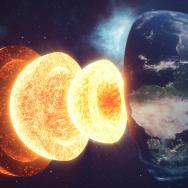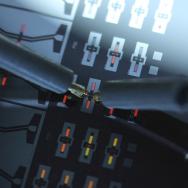There are few scientists who would describe condensed matter physics—a branch that studies the behavior of solid matter—as “simple.” But to Prof. Giulia Galli, it’s less complex than the problems she works on at the University of Chicago.
“Problems like water and energy are much more complicated than what I was trained for in condensed matter physics,” she said. “All of my work is driven by problems.”
It’s complex problems like these that the Pritzker School for Molecular Engineering—the first of its kind to focus on this emerging field—was set up to solve. And it’s the kind of innovative research that Galli, a theorist who uses computational models to figure out the behavior of molecules and materials, is helping tackle through her pioneering work.
The focus of Galli’s studies is to understand and predict how to harness molecular behavior to improve technology, particularly in the areas of purifying water, speeding up computation and sensing with quantum technology, and perfecting renewable energy technology.
“Essentially, we predict how atoms arrange themselves,” explained Galli, the Liew Family Professor of Molecular Engineering at UChicago. “We do this by developing theoretical algorithms and powerful codes and simulations in order to understand the quantum mechanics at play in a given material.”
For example, her group can use theory to predict which material will make a cheaper solar cell, or suggest a new configuration for a quantum bit made from electron spins. “Energy and water are incredibly important problems—even a small improvement from your science can have a huge impact,” she said. “This is really important to me.”
Galli, who also heads the Midwest Integrated Center for Computational Materials, has garnered international recognition for her work in helping shape the field. She recently received the Feynman Theory Prize, an annual honor highlighting extraordinary work in harnessing quantum mechanics for the public interest. It was her fourth such major award in her field this year.
“It is not difficult to understand why Giulia has been recognized as a scientific leader by a diverse set of scientific organizations,” said Matthew Tirrell, the founding Pritzker director and dean of the Pritzker School of Molecular Engineering. “She wields powerful and versatile computational tools that she has deployed to learn about many important scientific matters, ranging from how water behaves to materials being explored for quantum device engineering.”
Deciphering atomic rules
Quantum mechanics describes the rules of atomic behavior at incredibly tiny scales—a world full of the unexpected, which Galli seeks to explain using computer codes. But the challenge of modeling the interactions between hundreds of thousands of atoms in a material is a Herculean task. Often she uses the Research Computing Center at the University, but for more complex simulations, her team uses the extremely powerful supercomputers at UChicago-affiliated Argonne National Laboratory, where Galli has a joint appointment.
The simulations may take months, depending on the problem; in fact, that Galli’s group is constantly running simulations on as many machines as they can get ahold of: “We’re running simulations every day, many at the same time. We probably have 15 projects running right now,” she said.
At the same time, she’s usually writing four or five papers at any given time; in between, she’s traveling to conferences, teaching, or working with students and postdoctoral researchers in her group.
Her field has changed a great deal over the years, as computers and data capacity have improved, but to Galli, it keeps her energized. “The problems are always changing. Nothing is ever boring.”
Since she moved to the PME from the University of California-Davis, she’s been able to work much more closely with scientists on the experimental side, creating a loop where their experiments validate and explore her theoretical predictions, and her insights suggest new avenues for experiments.
One such collaborator is David Awschalom, the Liew Family professor in molecular engineering and director of the Chicago Quantum Exchange, who has worked with Galli for years at PME.
“Giulia’s innovative work on exploring materials for quantum information science and technology is guiding research programs at the University of Chicago and around the world,” said Awschalom. “Her innovative research is based on identifying important problems in materials science, developing a unique theoretical approach that is informed by experimental measurement, and ultimately resolving outstanding questions about the dynamics of complex systems with predictive models.”
Addressing a ‘data crisis’
More recently, she’s become interested in addressing a problem in the field of science known as the data reproducibility crisis. All good experiments and calculations have to be able to produce the same results, no matter who’s doing the experiment or carrying out the simulations; but as simulations grow more complex and the amount of data skyrockets, it becomes harder for other scientists to be able to check someone’s work.
Galli began providing links for interested parties to download the data (and codes) from her work, but that was only a local solution. To address the problem on a larger scale, Galli created a publicly available tool called Qresp that provides a framework for researchers to share their data and workflows, so that others can see how the results were reached—and try to poke holes in it.
She sees this as essential for science—and for scientists.
“The job of a good scientist is to constantly doubt your answers,” Galli said. “The minute you get results, you have to think about how to validate them. How to find a different way to evaluate them. To push and challenge yourself. To do what you don’t yet know how to do. That’s what I tell my graduate students.
“The real job of a scientist is to come up with a way to solve a problem that nobody else knows how to solve. And then to challenge yourself, over and over again, to make sure your solution is correct and robust.”

